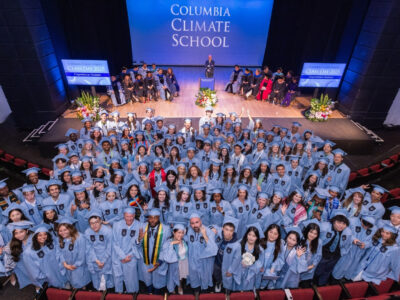Climate
-

AI and Climate Justice: Balancing Risk With Opportunity
As AI expands its global reach, how can we ensure its just and inclusive use when applied to climate science?
-

Climate Mobility in Focus: Highlights From MR2025
Drawing academics, policymakers and practitioners from around the world, the conference addressed themes of climate mobility, adaptation and wellbeing.
-

Columbia Climate School Students Take On Coastal Flooding at a U.N. Conference
At the Global Platform for Disaster Risk Reduction Summit, a team of postgrad and current students worked through the night on a multimedia presentation of hazard predictions and proposed solutions.
-

African Societies Survived Climate Shifts for Millennia by Diversifying How They Lived
New research sheds light on how communities adapted to past climate change, offering lessons for current and future challenges.
-

MR 2025: Building Mobility, Resilience and Connection in a Changing Climate
At MR2025, local and international scientists, policymakers, academics and community members will join representatives from different sectors to discuss climate mobility, adaptation and wellbeing.
-

Congratulations to the 2025 Graduates of the Columbia Climate School
On May 16, M.A. in Climate and Society students gathered to celebrate their accomplishments.
-

Transcript: An Animated Energy Primer With Climate School Dean Alexis Abramson
The Climate School dean shares her tips on how to reduce both your energy bills and carbon footprint.
-

Animated Infographic: Cool Tips for Hot Days (And Lower Bills)
With the current heatwave gripping the eastern U.S., we’re revisiting this story—originally published back in May—on practical ways to stay comfortable and cut energy costs during extreme weather.
-

Energy Efficiency Begins at Home: A Conversation with Alexis Abramson
The Climate School dean discusses how she first became interested in energy efficiency, how heat pumps work, and how homeowners can minimize their carbon footprint and energy bills.
